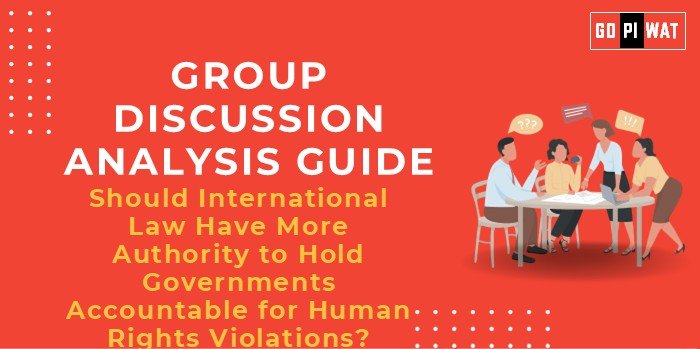📋 Group Discussion (GD) Analysis Guide
🌍 Should International Law Have More Authority to Hold Governments Accountable for Human Rights Violations?
🌐 Introduction to the Topic
Context Setting: International human rights law aims to uphold universal principles, yet enforcing accountability remains challenging in a world of sovereign states. This tension is pivotal as global issues like migration crises and conflicts highlight the need for stronger enforcement.
Topic Background: Established under frameworks like the UN Charter and Universal Declaration of Human Rights (UDHR, 1948), international human rights laws rely on voluntary compliance and diplomatic pressure rather than binding authority. Recent cases, such as the Syrian conflict or Uyghur detentions in China, emphasize gaps in accountability.
📊 Quick Facts and Key Statistics
- 📋 UN Human Rights Violations Investigations: 70+ active inquiries worldwide, underscoring the prevalence of issues.
- 🏠 Global Refugees: 35.3 million (UNHCR, 2023), often stemming from rights abuses.
- 📉 Non-Compliance Rates: 45% of countries fail to comply with UN human rights recommendations.
- ⚖️ ICC Convictions: 31 cases since 2002, showing limited global enforcement reach.
🤝 Stakeholders and Their Roles
- National Governments: Enforce or violate human rights laws; often resist external oversight.
- United Nations & ICC: Advocate, investigate, and provide forums for legal accountability.
- Non-Governmental Organizations (NGOs): Document abuses, influence public opinion, and push for international action.
- International Community: Countries or coalitions (e.g., EU, ASEAN) applying diplomatic or economic pressures.
🏆 Achievements and Challenges
Achievements
- ✅ UN Frameworks: Provided global benchmarks for human rights.
- ⚖️ ICC Operations: Prosecuted leaders (e.g., Slobodan Milošević) for war crimes.
- 📣 Global Awareness: Increased advocacy through NGOs and social media campaigns.
Challenges
- ⚠️ Sovereignty Issues: Governments claim rights violations as internal matters.
- 📉 Enforcement Mechanisms: Limited powers to implement binding decisions.
- 🛑 Selective Justice: International law often targets weaker states, with major powers evading accountability.
🌍 Global Comparisons
- 👍 Success: Rwanda’s post-genocide justice system supported by international courts.
- 👎 Challenge: China and the US avoiding ICC jurisdiction.
📌 Case Study: Rohingya Crisis – Myanmar’s government faced weak repercussions despite mass human rights abuses.
🗣️ Structured Arguments for Discussion
- ✅ Supporting Stance: “Empowering international law could deter violations, as seen with reduced atrocities in post-conflict regions supported by the ICC.”
- ❌ Opposing Stance: “Granting more authority to international law undermines national sovereignty and risks misuse by powerful states.”
- ⚖️ Balanced Perspective: “While stronger mechanisms are needed, these must respect sovereignty and ensure impartial application.”
🎯 Effective Discussion Approaches
Opening Approaches
- 📈 Start with impactful data, e.g., “With 35.3 million refugees fleeing violations, accountability is non-negotiable.”
- 📚 Highlight a case study like the Rohingya crisis to set the stage.
Counter-Argument Handling
- ✔️ Rebut sovereignty concerns by emphasizing existing international treaties voluntarily signed by nations.
- 💡 Address bias by advocating for reforms in enforcement processes.
📈 Strategic Analysis of Strengths and Weaknesses
- ✨ Strengths: Provides global standards, supports advocacy efforts.
- ⚠️ Weaknesses: Weak enforcement, political manipulation risks.
- 🌟 Opportunities: Reforms to strengthen neutrality, leverage technology for tracking violations.
- ⚔️ Threats: Growing nationalism and resistance to global governance.
📚 Connecting with B-School Applications
- 🌍 Real-World Applications: Policy analysis, strategic planning for NGOs, or global business ethics frameworks.
- 💬 Sample Interview Questions:
- “How can international business address human rights compliance challenges?”
- “Evaluate the role of corporations in supporting global human rights laws.”
Insights for B-School Students: Develop frameworks balancing global norms with local contexts and consider cross-border partnerships for rights advocacy projects.


